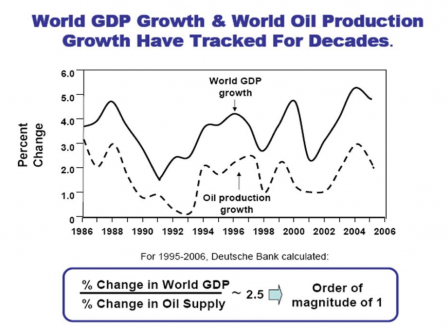In economics, we teach everyone that Land, Labor and Capital are the elements of production. Along the line, we forgot that energy from cheap oil is what made deploying Capital so important. We started to believe that growth was automatic. And we taught that to millions of students.
The U.S. Department of Education shows 4,861 colleges and universities with 18,248,128 students in 2007. We are teaching these students wrong. Millions of students are being taught that finite resources are not important.
The cover of the July 4th edition of Barron’s magazine says Get Ready for $150 Oil:
…As oil producers’ spare capacity gradually declines to worrisome levels, the average monthly price could reach a record $150 per barrel by next spring, with spikes to $165 or $170. With this, $4.50-a-gallon gasoline will become the norm. That will put a huge dent in consumer wallets, while ramping up the desirability of fuel-efficient cars.
Why is this a surprise?
We’ve known about Peak Oil for at least 20 years. How come our whole country was not warned, so we could be preparing?
Maybe this complex society we have built from cheap oil has become too complex to understand?
To look back: In the 1600s, those who owned lots of land were wealthy. The energy that made things grow was the sun. So the more land you had, the more sun energy was working for you. Makes sense.
Then in the 1700s, we started to use metal tools to produce more food and so we had extra people floating around. We organized the extra people in factories, and with steam engines we produced wealth. Okay, that’s understandable. The Industrial Revolution came about and Labor was an important factor of production. So far, so good.
Then in the mid-1800s we started to use cheap oil, and over the next 150 years we built a very complex society. We needed to keep score and deploy resources and so we described that as Capital. And things became very complex.
So what happens as oil starts to decline? It seems to me that the total amount of work the people of the world can do will also decline. Let’s say that instead of a full four quarts of gas, you are sent out to cut down trees with your chainsaw and only three quarts of gas. You will probably produce fewer logs and be less productive.
I think that is what we can expect to happen to the world economy.
I truly believe that the social science of economics has lost its way.
This is Part One of a three part discussion. See Part Two here.

